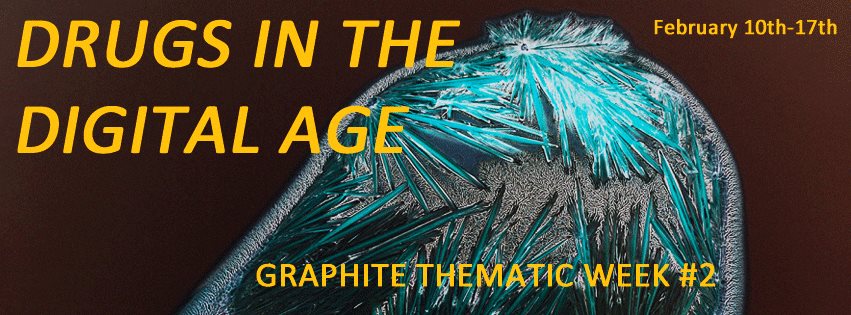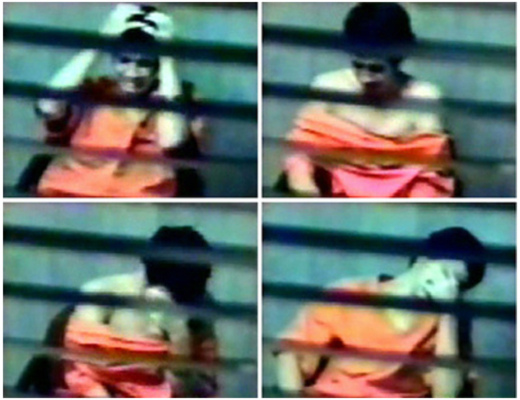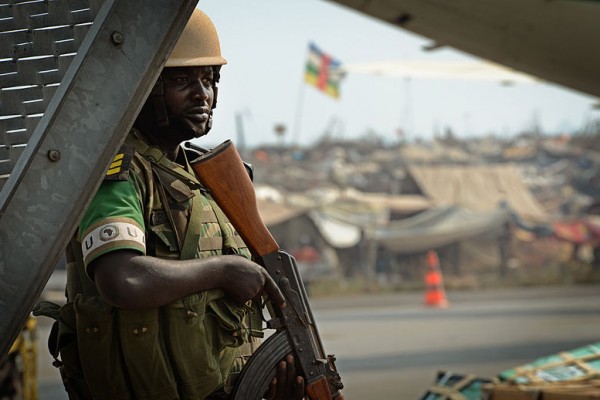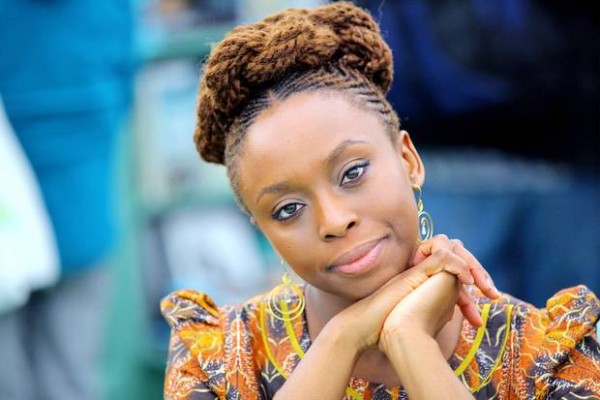Imagine you are an average 15 year old kid. Now imagine everyone in a position of authority over you, be they your parents, the American military, or your fellow Canadians, completely destroying any semblance of trust you had in them.When the breaking of that trust is manifested in violence, torture and psychological manipulation, you are no longer an average 15 year old. But rather, a personification of the injustices of the international community, with a cynical innocence, trapped with high-profile fugitives in an atmosphere bereft of basic human rights.
Omar Khadr, born in Toronto of Egyptian origins, suffered this fate.
On Wednesday, McGill University’s Cinema Politica screened a documentary titled “You Don’t Like The Truth: 4 Days Inside Guantanamo” based on the footage of a 2002 interrogation of Omar Khadr by Canadian authorities. There might have been lies on both sides. However, the general portrayal of thoughts, words and expressions left Omar Khadr, labelled a ‘terrorist’, as a symbol of truth, and his Canadian overseers like seemingly manipulative and self-interested beings.
The Story of Omar Khadr
The son of a man with heavy links to Al-Qaeda, Omar Khadr was caught in a firefight in Afghanistan in 2002. He was captured by US soldiers and interrogated and tortured at Bagram and Guantanamo Bay for over ten years. Eventually, he signed a plea admitting guilt in killing a US medic with a hand grenade. Currently, his saga continues in solitary confinement in Edmonton, Canada.
Khadr at the age of 14.
Omar was not supposed to be in the compound on the day he was injured. His father had taken him as a translator for he was fluent in four languages, including Pashto. According to sources close to him, Omar claims he was the first person to be wounded in the attack on the compound. He says the others helped him find shelter throughout the alleged ‘four hours’ of fighting, until he was shot twice in the back. Individuals that sympathize with the then minor, claim that his survival can only be attributed to the fact that he did not partake in the active fighting.
Having being taken to a US military base, Omar gained consciousness after a week only to be told that he was a war criminal who would be held accountable for the death of an American citizen. According to UN regulations Omar was a child soldier, and his safety and protection, rather than torture and mistreatment, was imperative. Even as a Canadian citizen though, his Middle Eastern origins and the antagonism towards him from the US, meant international justice did not apply to Omar.
His story, which is the only first-hand account possible, still has not been heard by the Canadian public or even the legal system. If he says he didn’t throw the grenade, the parole board will say he is not taking responsibility for his actions. And if he talks about his captivity, the US military will call it recidivism, as they have in the past when Guantanamo victims were released and tried to speak out about their experiences.
The Canadian Interrogation
The film tried to capture the essence of Omar Khadr’s story by the portrayal of an interrogation carried out by Canadian authorities in Guantanamo over four days. It starts off with hope, as Omar, beaten to the pulp, talks about his background and the relations his father had with Osama Bin Laden and Al-Qaeda.
Any positive vibes completely destroyed, Omar comes back the second day with a completely defeatist and mistrustful mentality, demanding protection. An expression of horror on his face, he desires medical attention, something his interrogators dismiss immediately, claiming he was being perfectly catered to. His cynicism, emotionality, youthfulness and anguish become apparent as Omar claims “nobody cares about me” and cries for his mother, for help, and for an authority he can trust.
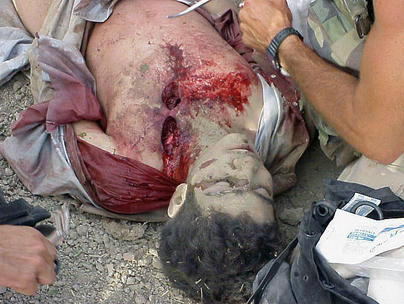
Two soldiers kneel over the wounded Khadr.
As his interrogations moves forward and the most striking element of the film is revealed. Omar’s interrogators are desperate for information, desperate for “something to take back to Canada.” The attitude of his interrogators, initially accommodating, turns out to be a quite vile representation of immoral behaviour. When Omar satirically moans about how they cannot empathize with his situation and position, the interrogators take pride in saying his position does not apply to them. They go on to talk about how they would rather be at the beach than carrying out this interrogation, and even try to use the ‘weather card’ to convince Omar that Cuba isn’t all so bad, for Canada has too much snow!
The value of empathy, as explained by individuals like Jeremy Rifkin and Roman Krznaric, is crucial in coming to terms with the problems of our civilization. While Omar’s ex torturer, also interviewed for the documentary, seemingly comes to terms with his struggle, the Canadian operation was detached, unsympathetic and psychologically scarring for someone who had many years still left imprisoned in Cuba.
A Symbol of Guantanamo
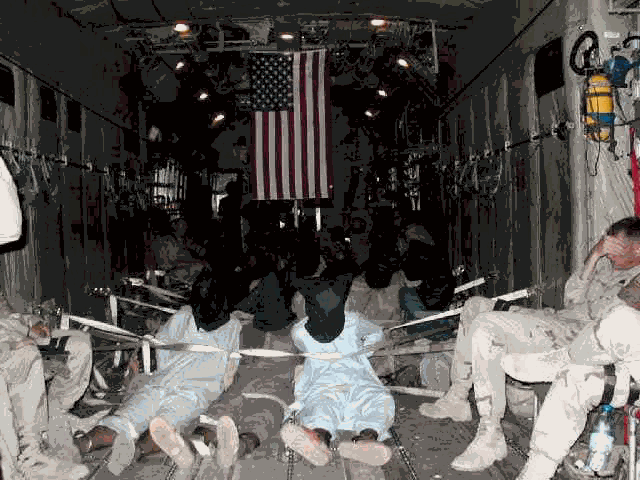
Suspects being flown in to Guantanamo.
Guantanamo Bay is a human rights violation set up by a war criminal, George W. Bush. Certainly several of the individuals in the military compound are threats to international security. But Omar, among many others, are just victims of an indiscriminate anti-terror policy, and symbols of US tyranny.
The legal system of military tribunals is a sub-standard one that does not uphold justice. Omar’s status as a minor, a child soldier and victim, rather than oppressor, should be enough to rally the moral authority of the international body politic-of international law. This story serves as a stark reminder of the ingrained prejudice in our vocal mission for universal human rights.
Perhaps the most striking line that manages to embody the perception and desperation of this young man came from his attorney who claimed when he first met Omar and joined his struggle, Omar had said: “You will leave me, everybody does.”
“You don’t like the truth,” said the boy in vain. In this case, the truth is Omar’s life itself, and if at 27 he is a “terrorist,” he is one that has been fueled entirely by a failed, even hypocritical, anti-terror policy stringently pursued by the US and its allies.
Let us know your thoughts in the comments section below.
Reference: http://freeomarakhadr.com/

